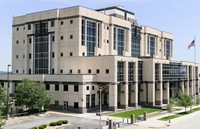Advertisement
Grab your lab coat. Let's get started
Welcome!
Welcome!
Create an account below to get 6 C&EN articles per month, receive newsletters and more - all free.
It seems this is your first time logging in online. Please enter the following information to continue.
As an ACS member you automatically get access to this site. All we need is few more details to create your reading experience.
Not you? Sign in with a different account.
Not you? Sign in with a different account.
ERROR 1
ERROR 1
ERROR 2
ERROR 2
ERROR 2
ERROR 2
ERROR 2
Password and Confirm password must match.
If you have an ACS member number, please enter it here so we can link this account to your membership. (optional)
ERROR 2
ACS values your privacy. By submitting your information, you are gaining access to C&EN and subscribing to our weekly newsletter. We use the information you provide to make your reading experience better, and we will never sell your data to third party members.
Policy
China Tied To Trade Secret Theft
Intellectual Property: Prosecutors charge that DuPont’s titanium dioxide technology was stolen at behest of government officials
by Marc S. Reisch
February 3, 2012

Federal prosecutors charged last week that Chinese government officials played a role in the theft from Dupont of technology to manufacture the paint pigment titanium dioxide.
According to a document filed on Jan. 31 in U.S. District Court for the Northern District of California, Federal Bureau of Investigation officials obtained letters in a search of the home of Walter Liew. The letters show that Liew “was tasked by representatives of the People’s Republic of China government to obtain technology used to build chloride-route titanium dioxide factories,” prosecutors say.
A memorandum allegedly written by Liew and obtained in the search claims that Liew was a guest at a 1991 banquet in his honor hosted by Luo Gan, a high-ranking official of the Communist Party. “At that time Secretary General Luo Gan gave directives, so that I would better understand China and continue to make contributions to her. Two days later I was given a list of key task projects by the appropriate Chinese agency. Titanium white by chlorination was one of the more important projects,” Liew wrote, according to prosecutors.
The search took place in July 2011 after DuPont filed a civil complaint in April against Liew and his California-based company, USA Performance Technology. Federal prosecutors revealed details of the FBI search as they sought to convince the judge in the case to deny Liew’s release from federal custody on $150,000 bail.
DuPont’s complaint alleged that Liew and others he employed embezzled technology from DuPont’s newest and most up-to-date TiO2 facility in Kuan Yin, Taiwan. Liew then sold the technology to a Chinese competitor. In August, federal prosecutors indicted Liew on charges of witness and evidence tampering and making false statements.




Join the conversation
Contact the reporter
Submit a Letter to the Editor for publication
Engage with us on Twitter